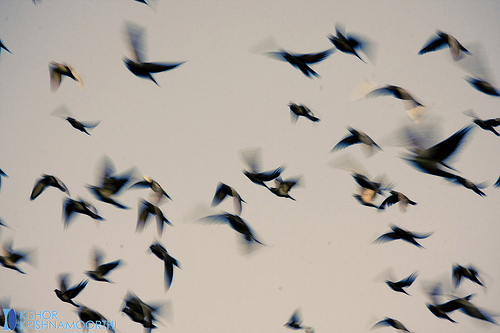FWP:
SETS == EK; IDIOMS; JO
SPRINGTIME: {13,2}
On this multivalent use of jo , see {12,2}. Thanks to its versatility, we can read the relationship between the two clauses in a variety of ways:
=Because spring is coming, therefore the Nightingale sings.
=Because the Nightingale sings, therefore spring comes.
=Because the Nightingale sings, therefore we know that spring is coming.
=Spring is coming, naturally accompanied by the Nightingale's singing.
=What the Nightingale sings is 'Spring is coming'.
As usual, we have no way of resolving these multiple possibilities, and we look to the second line for any hope of clarification. But of course the second line starts afresh and offers us new complexities. If we read the second line as 'it is a single/special flying-ish news from the tongue of the birds', then we have to ask what the 'it' is. Presumably something in the first line, but what exactly? That the spring is coming? That the Nightingale is singing? And do the 'birds' include the Nightingale, or is he to be taken as a separate (superior) singer and harbinger of spring?
And if we read the second line as 'there is a single (special, etc.) flying-ish news from the tongue of the birds', we have even more possible ways to connect it to the first line. Is the 'flying-ish news' news that the spring has come, and/or that the Nightingale is singing, or is it something else entirely? Might the rumor from the ordinary birds be different from what the Nightingale is singing? After all, their report is just a rumor, a 'flying-ish news', while his might be something else entirely. And it's also just 'one' or 'a single' [ik] such rumor (though possibly special, etc.). Might that mean it's just one story or rumor among many that we hear, or one among many that they tell? Or might it refer to unanimity, with all the birds spreading the same bit of gossip? And how trustworthy are the birds as reporters-- even reporters of gossip?
In other words, it's not clear how reliable is the word that spring has come, and who is spreading the word, and why. Yet it's a funny thing to be suspicious about! Spring does come, and why would anyone lie about it? What would anyone have to gain? Perhaps because the spring is so desperately longed for and so eagerly awaited-- perhaps observers are prone to jump the gun and spread the good word prematurely.
Ultimately, all the grammatical complexities and possibilities fall away; it's the idiomatic expression 'flying news' [uṛtī-purtī ḳhabar] that is at the heart of the verse, as Nazm observes. And the association with birds is so perfect that surely nobody could fail to enjoy
it; it creates such a fresh and vivid springtime mood. In his usual style, Ghalib has contrived to use the expression both idiomatically and in its literal sense.

Nazm:
That is, the Nightingale's melody is the 'flying news' of the spring. This simile is extremely eloquent [balīġh]; and to do it justice, it is new. (261)
== Nazm page 261